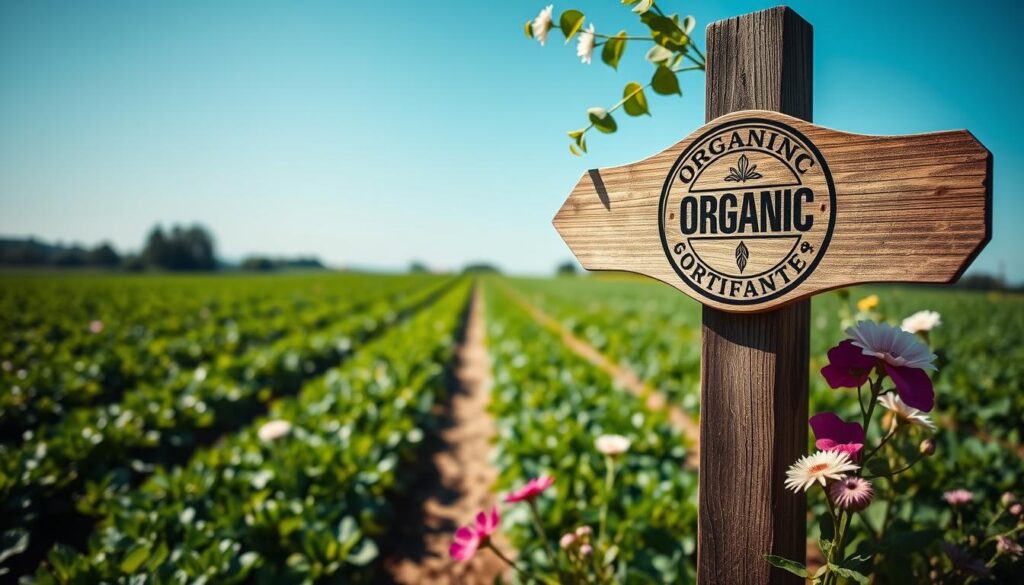
Why Organic Foods Are Better for Your Health Today
In today’s world, health is more important than ever. That’s why organic foods are becoming more popular. They are free from harmful pesticides and chemicals. This makes them a top choice for those who care about their health in the United States.
Organic farming is all about growing crops without synthetic fertilizers, pesticides, or GMOs. This approach reduces exposure to harmful substances. It also makes farming more natural and sustainable. By choosing organic, you know your food is grown in a way that’s good for the planet.
Key Takeaways
- Organic foods are free from synthetic pesticides and chemicals, providing a healthier alternative to conventional produce.
- Organic farming practices promote sustainability and environmental stewardship, reducing the impact on our planet.
- Organic foods often contain higher levels of essential vitamins, minerals, and antioxidants compared to their conventionally grown counterparts.
- Choosing organic supports a more transparent and accountable food system, empowering consumers to make informed choices.
- Organic agriculture helps to preserve biodiversity and protect the health of ecosystems, ensuring a brighter future for generations to come.
Understanding Organic Foods: Benefits and Production Standards
More and more people are choosing organic foods for their health. But what makes a food organic? And how do these foods differ from non-organic ones? Let’s explore the organic certification and the farm-to-table journey that brings these healthy foods to you.
What Makes Food Truly Organic
For a food to be USDA organic, it must be grown and processed without synthetic pesticides, fertilizers, or GMOs. Organic farmers use sustainable methods like crop rotation and natural fertilizers. This not only makes the food taste better and be more nutritious but also helps the environment by supporting biodiversity and reducing pollution.
Certification Requirements and Labels
The USDA has a strict certification process for organic producers. Foods with the USDA organic seal have at least 95% organic ingredients. Labels like “made with organic ingredients” or “organic” show different levels of organic content. So, it’s key to check labels when buying organic products.
Farm-to-Table Process
Organic farming is all about sustainable practices from start to finish. Farmers choose non-GMO seeds and use natural pest control. They work hard to care for the land and grow quality, nutritious foods. These foods are then processed and distributed by certified organic handlers, keeping the organic label intact from farm to table.
| Organic Label | Organic Content |
|---|---|
| USDA Organic | At least 95% organic ingredients |
| Made with Organic Ingredients | At least 70% organic ingredients |
| Organic | Less than 70% organic ingredients |

Key Health Advantages of Choosing Organic Foods
Choosing between conventional and organic foods is crucial for a healthy lifestyle. Organic foods are packed with antioxidants and nutrients. They also have less pesticide exposure, making them better for clean eating.
Research shows organic produce has more vitamins, minerals, and antioxidants than conventional foods. These nutrient-rich foods boost your immune system and support long-term health. This is good for your health. Conventional farming uses these chemicals, which can harm your body. Choosing organic reduces your exposure to these harmful substances.
The benefits of organic foods are clear. They offer better nutrition and less chemical exposure. Switching to clean eating is a step towards a healthier life. It benefits your body and the environment.
Conclusion
Choosing an organic lifestyle offers many benefits beyond just personal health. By picking organic foods, you’re not only feeding your body well. You’re also helping to build a sustainable future.
The process of getting organic products is strict. It ensures you get the best, most nutritious food available. This is thanks to the farm-to-table approach.
Living an organic lifestyle has many long-term benefits. It boosts your health and supports the environment. It also helps make the food system fairer for everyone.
By choosing organic, you’re making a positive impact. You’re shaping a better future for yourself, your community, and the planet. This is a powerful way to make a difference.
So, why not start making healthier choices today? Add more organic foods to your meals. Support local farmers and encourage others to do the same. Together, we can make the world a greener, healthier place.
FAQ
What is the difference between organic and conventional farming?
Organic farming doesn’t use synthetic pesticides, fertilizers, or GMOs. It focuses on healthy soil and natural ecosystems. On the other hand, conventional farming often uses these methods.
Are organic foods more nutritious than non-organic?
Yes, many studies show organic produce has more nutrients like antioxidants and vitamins. This is because organic farming prioritizes soil health and biodiversity.
How can I identify certified organic products?
Look for the USDA Certified Organic seal on food packaging. This seal means the product meets strict organic standards set by the USDA.
Are organic foods more expensive than conventional?
Yes, organic foods usually cost more. This is because organic farming is more expensive and in demand. But, many see the health and environmental benefits as worth it.
What are the environmental benefits of organic farming?
Organic farming improves soil health, biodiversity, and water use. It avoids harmful chemicals, reducing soil, water, and air pollution. It also helps fight climate change by storing carbon in the soil.
How can I incorporate more organic foods into my diet?
Begin by choosing organic for the “Dirty Dozen” items like strawberries and spinach. Replace these with organic options. Also, look for organic dairy, meat, grains, and other staples.